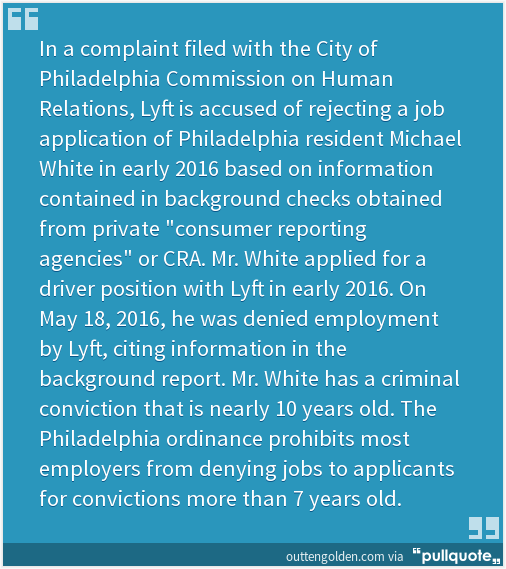Search
Did Lyft violate Philly’s Ban the Box rules? And could this be the tip of the iceberg?

Rideshare service, Lyft, Inc., allegedly violated Philadelphia’s Fair Criminal Records Screening Standards Ordinance, also known as Ban the Box, according to this press release from the law firm Outten & Golden LLP.
Here’s a snippet from the press release:
What is “Ban the Box”?
Philadelphia’s Ban the Box rule, about which I’ve blogged before here, limits when private employers can ask about an applicant’s criminal history. It also hamstrings private employers from overreaching and denying employment to folks with really old criminal convictions that have nothing to do with the job opening.
Is Lyft a private employer?
Wait a darn minute! I thought Lyft drivers weren’t employees, but independent contractors. That’s what Lyft says. Therefore, could Lyft be considered an “private employer” that offers “employment” under the Ban the Box rule?
Here’s what Ban the Box says:
- “Employment” means any occupation, vocation, job, work for pay or employment, including temporary or seasonal work, contracted work, contingent work and work through the services of a temporary or other employment agency; or any form of vocational or educational training with or without pay. “Employment” shall not, for the purposes of this Chapter, include membership in any law enforcement agency, or domestic services in or about the private home in which the employer resides, as defined in the Pennsylvania Minimum Wage Act, 43 P.S. § 333.101, and its regulations at 34 Pa. Code § 231.1 (b).
- “Private employer” means any person, company, corporation, labor organization or association which employs [ten or more] any persons within the City of Philadelphia. It includes job placement and referral agencies and other employment agencies.
Well, if Lyft drivers aren’t employees, and Lyft doesn’t have 10 or more folks whom it otherwise does employ within the City, then Lyft is not a “private employer.” Thus, Mr. White would be out of luck here.
But, wait! Is there more?
What if Lyft is wrong? Could this be a test case to see if a Philadelphia court — there’s no diversity jurisdiction or federal question to remove to federal court — eventually concludes that Lyft employs its drivers. Then, a separate class action may not be far behind. Maybe even a separate class claim under the Pennsylvania Minimum Wage Act?
Unless drivers sign arbitration agreements with class-action waivers, which happens to be an issue that the Supreme Court will entertain soon.
This is beginning to sound more like chess than checkers…
 The Employer Handbook Blog
The Employer Handbook Blog



